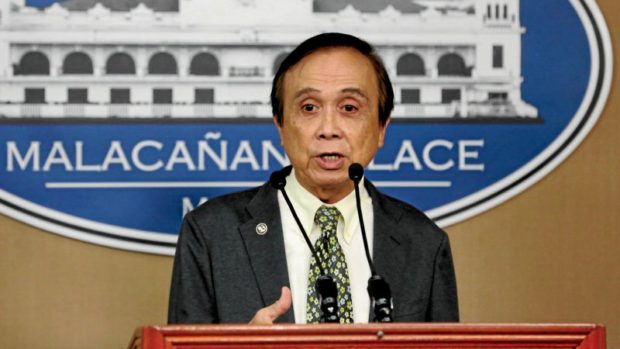
Socioeconomic Planning Secretary Ernesto M. Pernia (File photo by JOAN BONDOC / Philippine Daily Inquirer)
President Duterte wants to ease foreign investment restrictions in several areas, including the telecommunications sector that is currently dominated by two giant companies.
But power transmission and distribution, water distribution and sewerage system are not covered.
The President issued Memorandum Order No. 16, dated Nov. 21, directing the National Economic and Development Authority (Neda) board to exert utmost effort to lift foreign investment limits and to support legislative initiatives to bring this about, including measures that seek to clarify the definition of public utilities.
The order came shortly after the President asked China to be the third telecommunications operator in the country, in an attempt to break up the duopoly enjoyed by Globe Telecom and PLDT and help improve internet speed and cellular phone service in the country.
A bill in the House of Representatives would limit the coverage of public utilities to the distribution and transmission of electricity, and to water distribution and sewerage systems.
Amendment
Passed in early September, House Bill No. 5828 would amend Commonwealth Act No. 146 (the Public Service Act) but does not mention the provision of telecommunication services as a public utility.
Should the measure and its counterpart in the Senate be approved, foreigners can own more than 40 percent of telecom companies.
Critics have warned that the legislation could open the economy to foreign ownership without the need to amend the economic restrictions stated in the Constitution.
Approval in 1st quarter
The 1987 Constitution restricts ownership of public utilities to companies that are at least 60 percent owned by Filipinos. Foreigners can own only up to 40 percent.
Socioeconomic Planning Secretary Ernesto Pernia expects the passage of the bills aimed at easing a number of foreign investment restrictions by the first quarter of next year.
Pernia, who is also director general of Neda, told reporters on Thursday that given the President’s push, priority sectors, such as retail trade, professions, utilities and construction, would soon be opened up to greater foreign participation.
In the memorandum, Neda was also tasked with informing the President about restrictions on foreign participation that could be lifted or eased without needing to pass new laws, for the amendment of the Tenth Regular Foreign Investment Negative List.
Every two years, the government releases the negative list, which names sectors where foreigners have limited participation.
Other areas where the Neda was directed to ease investment restrictions were contracts for the construction and repair of locally funded public works, private recruitment, practice of particular professions, teaching at higher education levels, retail trade enterprises, domestic market enterprises, and culture, production, milling, processing and trading (except retailing) of rice and corn.
Foreign teachers, mass media
The President issued the order “to raise the Philippines’ level of competitiveness, and to foster higher economic growth in the Association of Southeast Asian Nations region and beyond through joint endeavors in the spirit of equality and partnership.”
Last week, Pernia said those to be removed from the foreign investment negative list were eight to 10 sectors, including the professions (teaching of foreign professors from foreign universities); public utilities, such as telecommunications (except water, sewerage and electricity distribution), and construction, specifically contractors.
Mass media and almost every sector, except land ownership, would be further opened up to foreign equity two years from now through an amendment to the Constitution, he said in October.
Once the government’s plan to liberalize nearly all industries by 2019 happens, foreign direct investment inflows could “easily double,” Pernia said.
He earlier said that economic managers were asking the President to certify as urgent the proposed amendments to the economic provisions of the 1987 Constitution. Mr. Duterte favors Charter change through a constitutional commission whose members are appointed.
Under the 1987 Constitution, no foreign equity is allowed in mass media, except recording; the practice of professions, especially law; utilization of marine resources in archipelagic waters, territorial sea and exclusive economic zones as well as small-scale utilization of natural resources in rivers, lakes, bays and lagoons; as well as manufacture, repair, stockpiling or distribution or both of nuclear weapons.
Only up to 30 percent foreign equity is allowed in advertising companies.
A cap of 40 percent is being applied not only in public utilities but also in foreign-led exploration, development and utilization of natural resources, ownership of private land, educational institutions other than those established by religious groups and mission boards, and operator of an infrastructure or a development facility requiring a public utility franchise.
As for land, Pernia said the economic managers were considering a 50-year lease contract to foreigners, renewable by another 50 years.